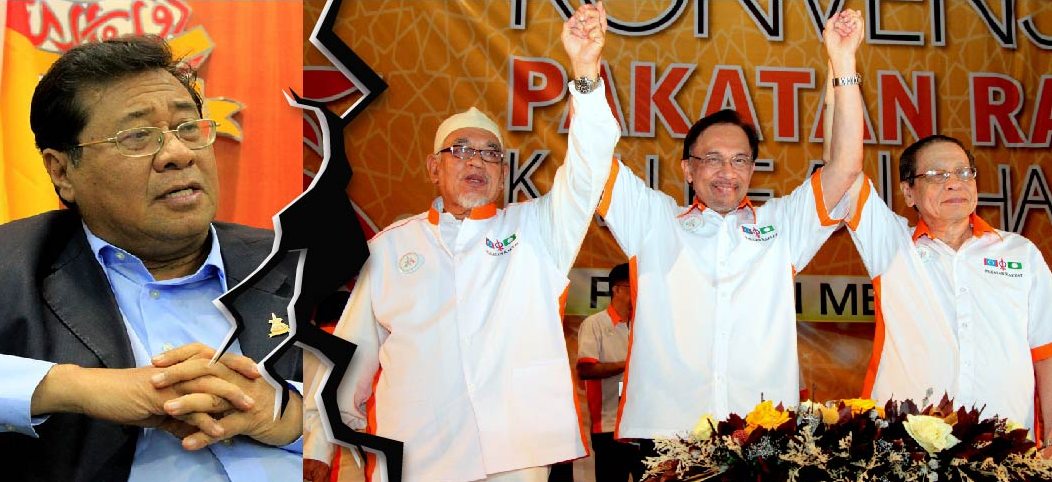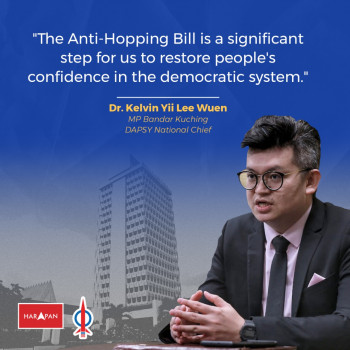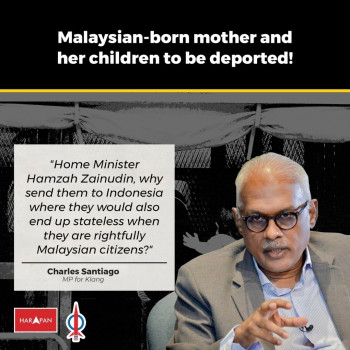 Cracks are showing in the six-year-old coalition, as the three parties’ ability to work through their differences has been tested through the recent Selangor Menteri Besar crisis.
Cracks are showing in the six-year-old coalition, as the three parties’ ability to work through their differences has been tested through the recent Selangor Menteri Besar crisis.
While PKR and DAP may consider PAS’ independent streak and “flirtation” with an UMNO-PAS cooperation as a sore point, PAS leaders have expressed unhappiness about the consultation process (or lack thereof) regarding the replacement choice for Tan Sri Khalid Ibrahim.
The fractious and seemingly messy handling of the MB crisis has rattled voters’ confidence in a state said to have the most sophisticated and well-informed electorate. Can Pakatan Rakyat survive this MB crisis and strengthen itself, or will we see an impending breakup on the cards?
By Anna Lee
The saga of replacing the Selangor Menteri Besar has stretched for six months, and is still ongoing. By now, it has become more than about the post, but the very nature of the three parties’ relationships are being questioned. It is the worst crisis that Pakatan Rakyat has faced in its brief history.
Observers note that the coalition relationship is fragile and loosely tied together, not only because of ideological differences but the clash between parties in decision-making. Within the parties, however, optimism is strong that the bond forged through common battles will prevail over differing viewpoints.
PKR and PAS have taken the brunt of the public hits for the fallout, mostly because Khalid was from PKR, while PAS had been reluctant to endorse Azizah as his replacement.
Many voters blame PKR for allowing the crisis to fester for so long and for the botched Kajang move which fizzled out once Anwar Ibrahim’s candidacy was no longer viable.
Academics have criticised PKR for its decision to go all out in “exposing” Khalid’s weaknesses. Commentators such as Wong Chin Huat had earlier advised the party to exercise its prerogative of changing the MB, without dragging out all the skeletons from the closet.
Selangor voters, too, have expressed confusion by PKR’s about turn – from singing Khalid Ibrahim’s praises as a successful first term MB – to demonising him now and dragging out the dirty linen.
Questioning his integrity at this juncture smacks of collusion, but PKR’s Rafizi Ramli insists that it was the right thing to do.
“I don’t mind being cursed or even being voted out for standing up for what I think and (for) getting rid of Khalid.
“This is (what) new politics is about. The old politics is when you know that Khalid is compromised and you fear the backlash of the public and you sit down and don’t do anything about it.”
The road back
That the party chose to do what it felt needed to be done instead of choosing the “easy road” of waiting for Khalid to complete its term, is a statement in itself.
It was a calculated risk to be adamant about the MB substitution, PKR and Pakatan risks hurting its public image and faces the unpleasant clash of differing views within the coalition.
The most obvious problem that the coalition must confront is from within. The power balance between the parties have always been a delicate matter with many unspoken lines to be drawn and redrawn.
DAP has never had a shot at the MB’s position since the Selangor constitution requires a Malay Muslim to take the post. The common agreement to allow PKR to make its choice of MB was jeopardised by PAS wanting to have a say in the matter with its own preferred candidate.
PAS Central Committee Member Dr Dzul concedes there were instances where PAS felt slighted that certain important decisions were made before consulting the party. He sees it as a learning phase for the new partners and that lessons from this process will arguably stand the Pakatan coalition in good stead.
“I feel we are still learning together as friends and colleagues. It is like in a new marriage, when you are still learning and getting to know each other.
“In this crisis of course many weaknesses in our relationship has been exposed, but I think we have learnt a lot.”
Dr Dzul says the coalition should admit and learn from its weaknesses and strive to overcome it. Voters would not be impressed and would get “fed up” if Pakatan were to repeat its mistakes, he said.
Coalition politics is something new to Malaysia and the demands of coalition politics from various and often differing ideologies is a challenge. There is still much to learn for PAS and DAP to work together as a team.
The honeymoon is over
The real challenge for Pakatan now is to win back the trust of the people. With its strong showing in last year’s general election, the tide of public approval has translated into greater expectations from the people.
It’s not enough for the parties to show that they are different, or better than Barisan Nasional. Voters want to see real policies and significant changes which affect their daily lives in concrete ways.
As DAP National Political Education Director Liew Chin Tong puts it, the “honeymoon” is over. While Pakatan enjoyed strong support from non-Malay voters due to UMNO’s increasing right-wing stand in the past two terms, the anti-government sentiment itself is not enough to make a lasting dent on the ruling coalition’s stranglehold on votes.
Based on a poll conducted by an independent pollster at the height of MB removal saga, the move has not cost Pakatan its non-Malay support yet, but has put a major dent into the Malay support for now.
Rafizi may be optimistic that the tide of opinion will turn, just as it has in the past after Anwar’s sodomy case, after the videos, etc, but others are less rosy with their forecast. One thing is for sure, the support of the voters cannot be taken for granted – by either side.
Pakatan Selangor has to work doubly harder, given that the younger cohort of new voters in the next GE will be the most savvy and exposed lot to go to the ballot box. Youngsters who have grown up with the easy accessibility to alternative media such as Malaysiakini are a completely different breed.
The wired-from-the-cradle generation are internet natives and harbour not only a deep distrust for the establishment but also scepticism for the opposition. The stakes are higher and so are these voters’ expectations for the political party of their choice.
To read the full three page coverage of this cover story, purchase the September issue of The Rocket
Subscribe to us at: http://gentamedia.com/product/the-rocket-subscription/



